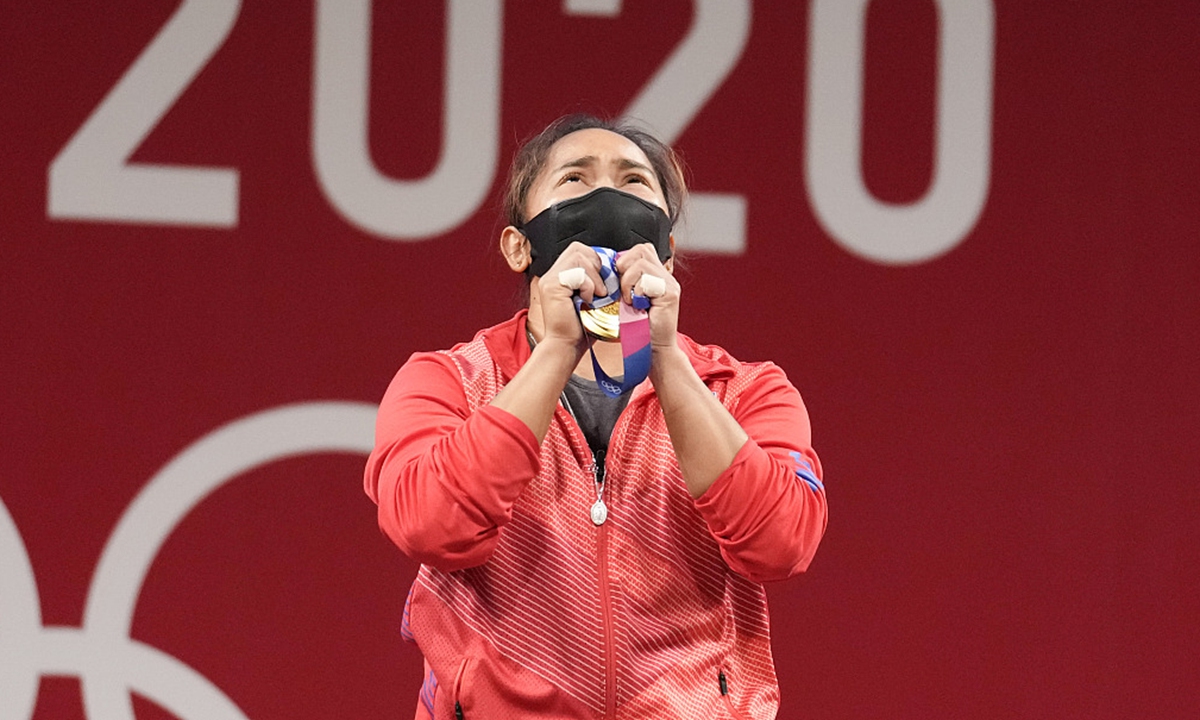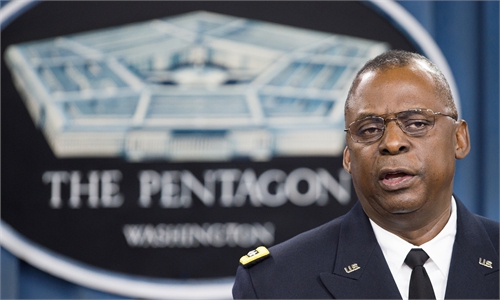Anti-China forces using athletes to propagate their views betray the Olympic spirit, the interests of the Philippines

Hidilyn Diaz Photo:VCG
The International Olympic Committee (IOC) amended its "Faster, Higher, Stronger" motto to include the word "Together" before the opening of the Tokyo Olympic Games, expressing the IOC's belief that the Olympic Games are designed to make a more united community of a shared future for all humanity. IOC President Thomas Bach has also expressed his opposition to politicizing the Olympics in an article for The Guardian, entitled "The Olympics are about diversity and unity, not politics and profit. Boycotts don't work."
However, such a vision has failed to stop malicious forces from constantly politicizing the Games.
The Philippines' Hidilyn Diaz became her country's first ever Olympic gold medalist on Monday after beating her Chinese rival to win the women's 55kg category for weightlifting at Tokyo 2020. Chinese Ambassador to the Philippines Huang Xilian immediately congratulated Diaz for her "historic gold." Meanwhile, Chinese media reported the gold in a positive manner, praising Diaz's good performance as "divine."
Chinese netizens also used the best words they could to show their respect for the Philippine athlete. Some even compared Diaz's gold with China's very first breakthrough gold won by sharpshooter Xu Haifeng at Los Angeles 1984. This precisely showed how much Chinese people were purely happy for her - and this is also the most vivid manifestation of the Olympic spirit.
Nonetheless, what Diaz has done and said in the following days after her win has not only shocked her Chinese fans. It has also raised questions regarding the large extent some political forces will go to politicize the Olympics and use athletes for their own political purposes and interests.
After posting a photo of her wearing a T-shirt with the "West Philippine Sea" - something that has never been recognized internationally - and its translation in Chinese characters on it, Diaz went on to say in an interview when she was asked about the South China Sea issue, "I just want to say that what is ours, is ours."
The incident has been thus hyped up by some Western and Philippine media outlets, who are trying to fit Diaz's achievements into their narratives of the disputes between China and the Philippines over the South China Sea. However, the outlets haven't realized that Diaz's gold largely hinged on a Chinese factor.
Her main coach is an experienced Chinese weightlifting trainer, Gao Kaiwen, who coached the famous Bayi (August 1) team of China. With Gao's devoted guidance and help, Diaz has managed to make a breakthrough for both herself and her country.
"This gold medal is exactly a reflection of the basic fact that China-Philippines cooperation is conducive for the latter. What Diaz has done shows her misinterpretation of her historic win," Li Kaisheng, a research fellow and deputy director at the Institute of International Relations of the Shanghai Academy of Social Sciences, told the Global Times on Saturday.
Athletics is one of the many areas in which China and the Philippines can cooperate in addition to investment and trade, and Diaz's success is proof that such cooperation can bear fruit.
There have always been anti-China forces in the Philippines, and they are very much against China on the South China Sea issue. They will not give up any possible opportunity to attack China to achieve their own political goals. Particularly with less than a year ahead of the elections in the Philippines, multiple forces are already in action. In this situation, Diaz, who is on active duty in the army, might have been used as a pawn by anti-China forces in the Philippines.
The Armed Forces of the Philippines (AFP) issued a statement on Wednesday to announce Diaz's promotion from Sergeant to the rank of Staff Sergeant. In the meantime, the AFP expressed their congratulations and hoped that Diaz may "continue to serve as an inspiration" to her fellow service members. Diaz's remarks possibly represent the political views of some pro-US and anti-China hard-liners in the Philippines, who have a different way of thinking in comparison to President Rodrigo Duterte's foreign policy, especially his China policy. Duterte believes that the Philippines does not have much to gain in a conflict with China.
In as early as 2019, Diaz went publicly against the Duterte administration in a TV program. Currently, it might be a good choice for pro-US and anti-China forces to use Diaz's influence to promote their anti-China ideas. But it is not in the Philippines' interest to over-provoke, cause further confrontations with China and hurt the feelings of the Chinese people.
It is important for the Philippines to cooperate with China rather than fight against it. This is a point Duterte has been stressing, and he has been striving to convince domestic public opinion that is pretty much influenced by the West.
As Herman Tiu Laurel, a columnist of the Filipino newspaper Pwersa, wrote, "I hope more Filipinos learn from Hidilyn's success, if they have not yet learned from Duterte's success: that working with China and the Chinese pays off for the Philippines and the Filipinos."
The author is a reporter of the Global Times. opinion@globaltimes.com.cn

